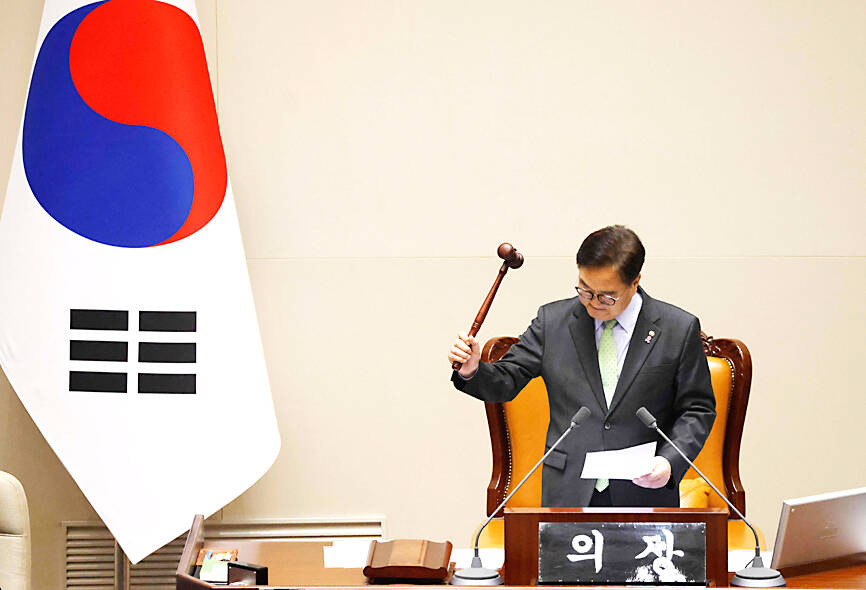South Korean President Yoon Suk-yeol escaped impeachment yesterday over his brief declaration of martial law, after lawmakers from his ruling party boycotted a vote, despite huge protests outside parliament.
Yoon stunned the nation and the international community on Tuesday night by suspending civilian rule and sending troops to the National Assembly, but was forced into a U-turn after lawmakers nixed his decree.
Opposition parties proposed the impeachment motion, which needed a two-thirds majority to pass, but a near-total boycott by Yoon’s People Power Party (PPP) doomed it to failure.

Photo: AFP
“The number of members who voted did not reach the required two-thirds majority,” National Assembly Speaker Woo Won-shik said, adding that as a result, the impeachment vote was “not valid.”
The country — and the world — was watching and it was “very regrettable that a vote could not even be held on such a significant national issue,” he added.
He said it signified “a failure to engage in the democratic process” on the part of the ruling party.
The PPP after the vote said that it blocked the impeachment to avoid “severe division and chaos,” adding that it would “resolve this crisis in a more orderly and responsible manner.”
The outcome disappointed the huge crowds — which police said numbered 150,000, while organizers said numbered 1 million — demonstrating outside parliament for Yoon’s ouster.
The opposition has already vowed to try again as soon as Wednesday, and many protesters vowed to continue demonstrations next weekend.
“I will impeach Yoon Suk-yeol, who has become the worst risk for South Korea, at any cost,” opposition leader Lee Jae-myung said.
Before the vote, Yoon, 63, apologized for the turmoil, but said he would leave it to his party to decide his fate.
“I caused anxiety and inconvenience to the public. I sincerely apologies,” he said in a televised address, his first public appearance in three days.
He said he would “entrust the party with measures to stabilize the political situation, including my term in office.”
The backing of PPP lawmakers came despite party head Han Dong-hoon — who was allegedly on an arrest list on Tuesday night — saying Yoon must go.
Only three PPP lawmakers — Ahn Cheol-soo, Kim Yea-ji and Kim Sang-wook — voted in the end.
The failure of the impeachment motion “means a more protracted political crisis,” said Vladimir Tikhonov, professor of Korean Studies at the University of Oslo.
“We will have a politically dead president — basically unable to govern any longer — and hundreds of thousands coming to the streets every week until Yoon is removed,” he added.
Had the motion passed, Yoon would have been suspended from duties pending a ruling by the South Korean Constitutional Court.
An opinion poll released on Friday put backing for Yoon at a record low of 13 percent.

A Chinese aircraft carrier group entered Japan’s economic waters over the weekend, before exiting to conduct drills involving fighter jets, the Japanese Ministry of Defense said yesterday. The Liaoning aircraft carrier, two missile destroyers and one fast combat supply ship sailed about 300km southwest of Japan’s easternmost island of Minamitori on Saturday, a ministry statement said. It was the first time a Chinese aircraft carrier had entered that part of Japan’s exclusive economic zone (EEZ), a ministry spokesman said. “We think the Chinese military is trying to improve its operational capability and ability to conduct operations in distant areas,” the spokesman said. China’s growing

Nine retired generals from Taiwan, Japan and the US have been invited to participate in a tabletop exercise hosted by the Taipei School of Economics and Political Science Foundation tomorrow and Wednesday that simulates a potential Chinese invasion of Taiwan in 2030, the foundation said yesterday. The five retired Taiwanese generals would include retired admiral Lee Hsi-min (李喜明), joined by retired US Navy admiral Michael Mullen and former chief of staff of the Japan Self-Defense Forces general Shigeru Iwasaki, it said. The simulation aims to offer strategic insights into regional security and peace in the Taiwan Strait, it added. Foundation chair Huang Huang-hsiung

PUBLIC WARNING: The two students had been tricked into going to Hong Kong for a ‘high-paying’ job, which sent them to a scam center in Cambodia Police warned the public not to trust job advertisements touting high pay abroad following the return of two college students over the weekend who had been trafficked and forced to work at a cyberscam center in Cambodia. The two victims, surnamed Lee (李), 18, and Lin (林), 19, were interviewed by police after landing in Taiwan on Saturday. Taichung’s Chingshui Police Precinct said in a statement yesterday that the two students are good friends, and Lin had suspended her studies after seeing the ad promising good pay to work in Hong Kong. Lee’s grandfather on Thursday reported to police that Lee had sent

A Chinese ship ran aground in stormy weather in shallow waters off a Philippines-controlled island in the disputed South China Sea, prompting Filipino forces to go on alert, Philippine military officials said yesterday. When Philippine forces assessed that the Chinese fishing vessel appeared to have run aground in the shallows east of Thitu Island (Jhongye Island, 中業島) on Saturday due to bad weather, Philippine military and coast guard personnel deployed to provide help, but later saw that the ship had been extricated, Philippine navy regional spokesperson Ellaine Rose Collado said. No other details were immediately available, including if there were injuries among